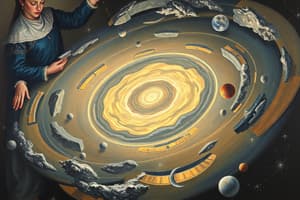Podcast
Questions and Answers
What is the law of universal gravitation?
What is the law of universal gravitation?
Newton's law of universal gravitation states that every object attracts every other object with a force that for any two objects is directly proportional to the mass of each object.
What is the universal gravitational constant?
What is the universal gravitational constant?
The universal gravitational constant, G, describes the strength of gravity.
What is the inverse-square law?
What is the inverse-square law?
When a quantity varies as the inverse square of its distance from its source, it follows an inverse-square law.
What is a gravitational field?
What is a gravitational field?
What causes ocean tides?
What causes ocean tides?
What was Newton's reasoning about the apple falling from the tree?
What was Newton's reasoning about the apple falling from the tree?
Why doesn't the moon hit Earth?
Why doesn't the moon hit Earth?
What theory of the solar system did Newton's theory of gravity confirm?
What theory of the solar system did Newton's theory of gravity confirm?
What did Newton discover about gravity?
What did Newton discover about gravity?
How does the force of gravity change with distance?
How does the force of gravity change with distance?
What kind of field surrounds Earth and causes objects to experience gravitational forces?
What kind of field surrounds Earth and causes objects to experience gravitational forces?
Describe the gravitational field of Earth at its center.
Describe the gravitational field of Earth at its center.
What sensation do we interpret as weight?
What sensation do we interpret as weight?
What happens to the gravitational field of a star that has collapsed into a black hole?
What happens to the gravitational field of a star that has collapsed into a black hole?
How did the formulation of the law of universal gravitation affect science?
How did the formulation of the law of universal gravitation affect science?
Flashcards are hidden until you start studying
Study Notes
Law of Universal Gravitation
- Newton's law states that every object attracts every other object.
- The gravitational force between two objects is directly proportional to their masses.
Universal Gravitational Constant
- Represented by G, it quantifies the strength of gravity in the gravitational equation.
Inverse-Square Law
- Describes how a quantity decreases with the square of its distance from the source.
Gravitational Field
- Surrounds a massive body and exerts forces on other masses within the field.
- Is a type of force field experienced by objects within it.
Ocean Tides
- Caused by the gravitational pull of the moon, resulting in differences on opposite sides of Earth.
Newton's Apple Analogy
- Reasoned that both an apple falling and the moon's orbit around Earth are due to gravitational attraction.
Moon's Orbit
- The moon falls toward Earth due to gravity but has sufficient tangential velocity to remain in orbit.
Confirmation of Copernican Theory
- Newton's gravity theory supported the heliocentric model of the solar system by Copernicus.
Universality of Gravity
- Discovered gravity acts universally, with all masses exerting a pull on each other based on mass and distance.
Gravity and Distance
- Follows the inverse-square law, meaning gravitational force decreases with the square of the distance.
Earth's Gravitational Field
- Earth is surrounded by a gravitational field that influences nearby objects, causing them to experience gravitational forces.
Gravitational Field at Earth's Center
- The gravitational field strength at the center of Earth is zero, due to equal force pull from all surrounding mass.
Sensation of Weight
- Weight is perceived as pressure against Earth's surface, resulting from gravitational forces.
Tidal Forces
- Ocean tides are specifically influenced by the gravitational differences caused by the moon's position relative to Earth.
Gravitational Field of a Black Hole
- A collapsing massive star into a black hole does not alter the gravitational field beyond its original radius.
Impact of Universal Gravitation on Science
- The law of universal gravitation catalyzed scientific progress, inspiring hopes that natural phenomena could be explained by simple universal laws.
Studying That Suits You
Use AI to generate personalized quizzes and flashcards to suit your learning preferences.




